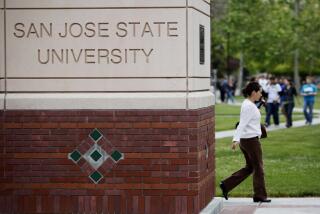SDSU Group Quietly Promotes Middle East Peace : Foundation Sponsors Agricultural Cooperation in Meetings of Egyptians, Israelis
- Share via
Working quietly and on a shoestring budget, the little-known San Diego State University Foundation has earned the praise of State Department officials for its seven-year effort to promote a Middle East peace by sponsoring a cooperative agricultural program between Israel and Egypt.
Ironically, the foundation’s success in bringing together Israeli and Egyptian agriculture researchers could have gone unnoticed were it not for the group’s recent failure in its first venture into the imbroglio of Middle East politics.
Keeping a low profile for seven years was difficult, said foundation General Manager Harry R. Albers, and was made all the more so by the project’s success. But the secrecy was essential, he said, given the political realities of the Middle East and the Arab world’s ostracism of Egypt for signing a peace pact with Israel.
The SDSU Foundation, a nonprofit corporation, has been in existence for 40 years. The foundation, which receives no money from the state, raises funds for SDSU research from private sources and has a current endowment of $30 million, from which it funds research projects in fields ranging from astronomy to zoology.
Research for the arid lands project in Egypt and Israel, which includes growing special species of vegetables and fodder, is funded by the State Department’s Agency for International Development. The program is administered with an annual budget of less than $100,000 from the foundation’s Fred J. Hansen Institute for World Peace, established in 1978.
In 1979, representatives of the estate of Hansen, a San Diego businessman, decided after talks with institute and foundation officials to provide funds to further world peace by trying to bring Israel and Egypt together in a spirit of scientific cooperation.
Gerald Kamens, director of Middle East affairs for AID, lauded the foundation-run desert agriculture research program for bridging the gap between two formerly bitter enemies.
Indeed, the foundation’s work in the Middle East was a closely guarded secret until last month, when Israeli officials announced that they would not allow two moderate Palestinian leaders to attend a group-sponsored meeting in San Diego. The talks, which would have included Israeli, Egyptian and Palestinian political leaders, were organized to discuss Israel’s occupation of Arab territories.
Although the meeting collapsed, Albers said the group remains undaunted and will continue to play a modest role in helping to find a peaceful solution to the Middle East’s problems by organizing similar meetings in the future and continuing to administer its agriculture research program in Israel and Egypt.
“We were terribly disappointed that our first attempt to bring the politicians together didn’t succeed,” Albers said. “However, the meeting was totally separate from what we have been doing very quietly and, I might say, successfully, since 1980 in both countries, particularly in the area of arid land agriculture. Outside of specialists in that field, few people know how successful we’ve been at bringing Israeli and Egyptian scientists together.”
The institute’s search for peace began in 1979.
“The Camp David peace agreement had just been signed,” Albers said. “When (Egyptian President Anwar) Sadat made his famous trip to Israel . . . Sadat and (Israeli Prime Minister Menachem) Begin mentioned two areas that were of mutual interest to their countries--oceanography and arid lands agriculture. . . . We took that as our cue.”
Acting on the seemingly innocuous comments by both leaders, Albers began contacting Egyptian and Israeli officials to find out what the foundation could do to help the peace process. After spending a year talking to the Agency of InternationalDevelopment, Egyptian and Israeli officials, the foundation learned that Congress had earmarked money to spend on cooperative programs between Egypt and Israel to assure success for the Camp David agreement.
Early in 1980, the foundation, using part of the $80,000 Hansen Institute budget, quietly arranged a weeklong meeting of U.S., Egyptian and Israeli oceanographers at the Mission Bay Hilton. The meeting led to a three-year, $2.4-million cooperative program between Egypt and Israel for marine research that was funded by AID and administered by New Jersey State University oceanographers.
“At that time the Egyptians were not interested in working directly with the Israelis,” Albers said. “But they said they would sign an agreement just with the American scientists. The Israelis would sign an agreement with the American scientists, and then the research would proceed. But there would be no agreement between Egypt and Israel. So, the separate agreements were termed ‘mutual bilaterals.’ ”
According to Albers, foundation officials were so enthused by the success of the meeting that they decided to launch their own research program, which was to be administered with Hansen Institute funds. Despite the fact that SDSU does not have a college of agriculture, foundation and institute officials decided to submit a proposal for arid lands research to AID and ask for funding.
In the summer of 1981, foundation officials arranged another secret meeting in San Diego. But this time the foundation invited Egyptian and Israeli scientists who specialize in desert agriculture.
The weeklong meeting included scientists from the Egyptian Ministry of Agriculture, Ben Gurion University in Israel and the United States. The end result of the conference was a proposal that was submitted to AID for a five-year, $5-million research project.
AID officials approved the proposal and the project’s success has exceeded the expectations of both Albers and the foundation. Robert Ontell, professor emeritus at SDSU, was brought out of retirement to direct the Hansen Institute and Mohammed El Assal, an SDSU sociology professor, was assigned to administer the foundation-managed research project in Egypt and Israel.
The research program is the only one of its kind currently in operation to involve a U.S. university working with Egyptian and Israeli officials, Albers said.
“The project was originally for five years, at $1 million a year. . . . It was the first trilateral program signed by Egyptians, Israelis and Americans. . . . Recently an AID evaluation team spent several months in Egypt and Israel, evaluating the program,” Albers said. “The evaluation was so high that AID gave us funding for three more years.”
Foundation officials say they are thrilled by the project’s success, but Kamens from AID and Albers said they also are encouraged by the cooperation that it has fostered between Egyptian and Israeli scientists.
“It has been very gratifying to see these individuals who have been on opposing sides for 30 years, and at times bitter enemies, working together,” Kamens said. “I can’t tell you enough what a reward this is, to see these people working together for mutual rewards, sharing their knowledge. . . . It’s simply wonderful.”
The project also requires both sides to visit each other’s research farms.
“There are visits back and forth,” Albers said. “People stay for a month or two. Some have stayed for a year. It’s not only leading to good science, which is beneficial to both countries, but it continues to foster cooperation between Egypt and Israel.”
Despite the project’s success, Kamens said, there are radical elements in Egypt who oppose all ties with Israel and want to see the cooperative agreement ended. Although the program is “open and above-board,” Kamens acknowledged that AID officials have counseled both sides “to be careful about publicity” so that Egyptian scientists and government officials can continue to work quietly on the project.
It is this concern about publicity that has prompted foundation officials to hold three meetings of Egyptian and Israeli scientists in secrecy in San Diego. Ontell, head of the Hansen Institute, said the January meeting that was derailed when Israeli Defense Ministry officials refused to issue travel permits to the two Palestinians was organized in secrecy over a period of eight months at the request of the Egyptian delegation.
“Egypt is trying to restore relations with the rest of the Arab world. They (Egyptians) requested, and the Israelis agreed, to meet without any fanfare,” Ontell said.
More to Read
Sign up for Essential California
The most important California stories and recommendations in your inbox every morning.
You may occasionally receive promotional content from the Los Angeles Times.













